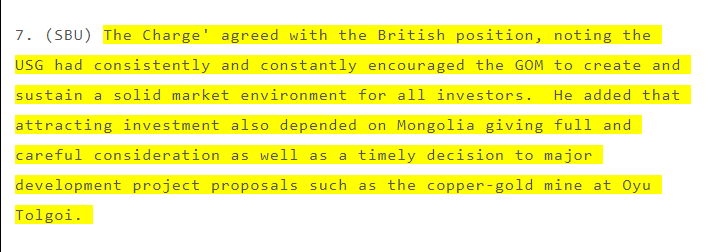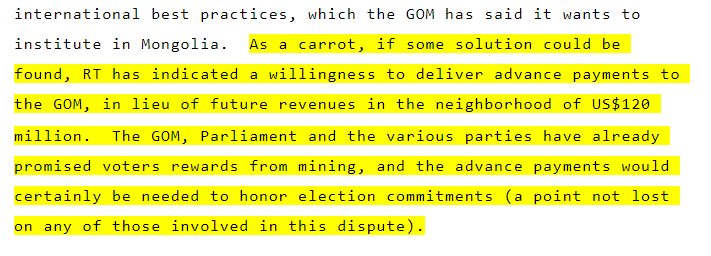Behind the scenes
“When the Russians left and they pulled out all their support for the country – it was bad. Food was rationed and children who grew up or [were] born in those years are smaller and underdeveloped compared to other generations. That is how bad it was. Then the ‘IMF, Harvard University and Goldman Sachs type of development gurus’ decided to experiment and introduce a shock therapy by starting simultaneous political and economic transition to a market economy. Just as the economy was beginning to stabilise and grow, the World Bank decided to push the Mongolian economy towards growth based on mineral extraction. All the mining produce goes to China: Mongolia has been made fully dependent on a single industry and a single market. The IMF bailing out Mongolia for the sixth time in 2017 is what mining does to the economy.” – Sukhgerel Dugersuren, Oyu Tolgoi Watch – source
Mongolia and its historically nomadic population have gone through a tremendous economic transformation over the past three decades. Following the disintegration of the Soviet Union and Mongolia’s regained independence in the 1990s, the International Monetary Fund (IMF), World Bank and Asian Development Bank, amongst others, stepped in to provide financial and policy support – but this support came with a lot of strings attached.
Economic shock therapy
These strings came in the shape of austerity measures that were implemented in order to transform the centrally planned economy into one that favoured the market and reduced public control over resources by privatising state assets and downsizing and decentralising the public sector. By 1995, 95% of Mongolia’s public assets in livestock, trade and services had been privatised. The ‘shock therapy’ re-regulated the Mongolian economy in order to pave the way for foreign public and private investment – putting in place an institutional framework facilitating foreign direct investment so as to fully capitalise on mining as a central revenue source for the Mongolian economy.
This entailed deregulating the mining sector, allowing for extensive private property rights, and a corporate-friendly fiscal policy including a lowering of tax rates and mining royalties. Less state control and increasing funds made available by the international financial institutions attracted mining firms like BHP and later Rio Tinto to seek access to Mongolia’s substantial mineral wealth. The accompanying market relations and privatisation clashed with Mongolia’s historically communal use of resources, resulting in what even the IMF called a [expand title=”“painful transformational recession””]Reference: Cheng, K.C (2003) Growth and Recovery in Mongolia During Transition. IMF Working Paper, IMF. Available at: https://www.imf.org/external/pubs/ft/wp/2003/wp03217.pdf, (January 20, 2020).[/expand]
These policy reforms resulted in an institutional framework that was strongly conducive to foreign direct investment, including a series of loans from International Financial Institutions (IFIs). Two decades of focus on mining, demanding huge foreign investment, left Mongolia with a crippling debt and an excessive budget deficit.
In 2017, Mongolia received its sixth IMF bailout since 1990 – substantially increasing the country’s external debt and bringing with it a number of challenging conditions, including wage freezes and other austerity measures.
At the mercy of mining companies
The dependence on commodities such as copper, gold and coal has made the Mongolian economy vulnerable to volatile price fluctuations. This left the government politically at the mercy of mining companies’ demands and contributed to reduced public control over resources.
This diminished state control has attracted mining firms seeking access to Mongolia’s mineral wealth. And this backdrop has paved the way for the mining giant Rio Tinto’s arrival on Mongolian soil – the odds were stacked strongly against Mongolia when it came to negotiating a fair agreement right from the outset.


![“Having joked privately that ‘we will be lucky if only 80% of the public opposes the plan’, chief GoM[6] [7] [Government of Mongolia] negotiator Ministry of Finance State Secretary Khurelbaatar is anxious to shepherd the [Oyu Tolgoi] deal through to cabinet and parliamentary approval with minimal public agitation before the State Great Hural’s (parliament) summer recess at the end of July. Ivanhoe [the Canadian mining company that originally owned the Oyu Tolgoi mine], silenced by a non-disclosure clause in the agreement, has reacted to perceived missteps and misstatements about the deal ‘with mouths bloodied from biting our tongues so hard,’ according to their reps. Although the deal has not yet produced street demonstrations on the scale of those held in January 2006, a small but vocal groundswell of opposition has begun to congeal…” - US Embassy July 2007 diplomatic cable, Ulaanbaatar, Mongolia](https://mongolia.somo.nl/wp-content/uploads/2020/02/Quote-having-joked-privately.png)
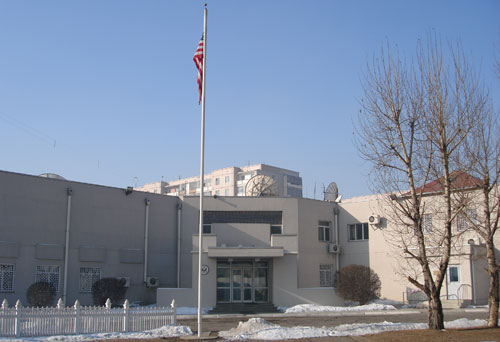


![“For U.S. commercial interests [in Mongolia] such as mining firms Peabody Energy and Rio Tinto and equipment makers Caterpillar, Ingersoll-Rand, Bucyrus, and John Deere, mining is THE industry [in Mongolia] that will provide the income necessary to ensure long-term purchases of U.S. goods and services.” (July 2009)](https://mongolia.somo.nl/wp-content/uploads/2020/02/Quote-3-for-u.s.-commercial-interests.png)
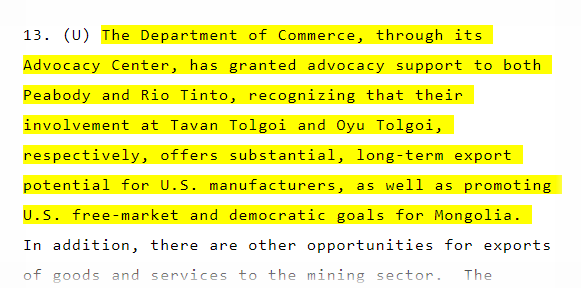

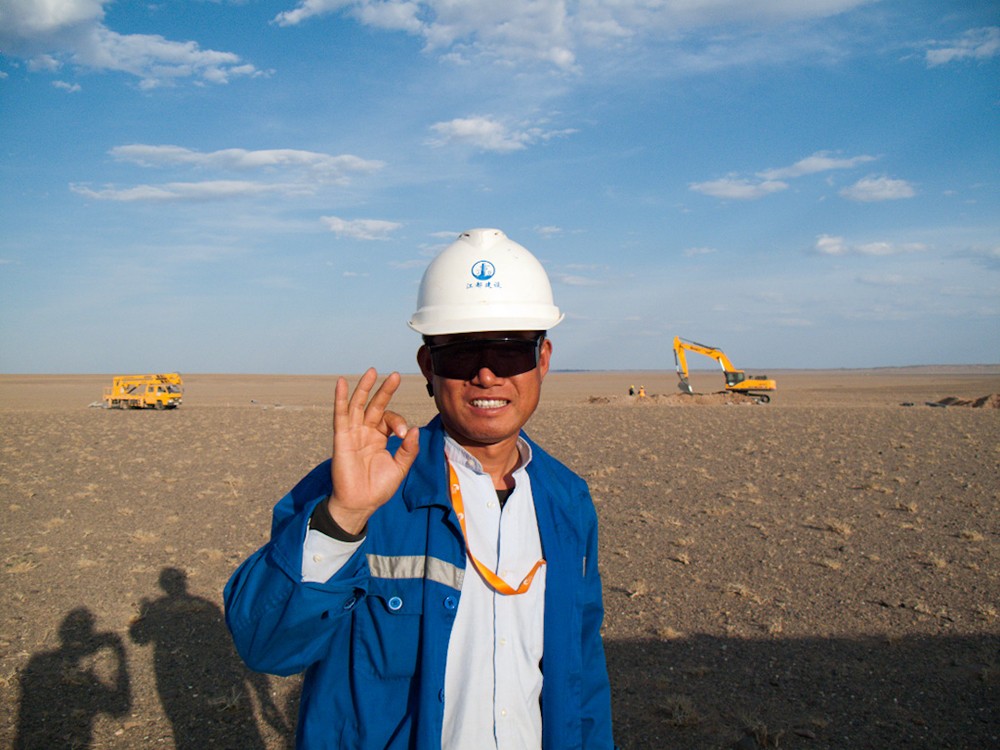

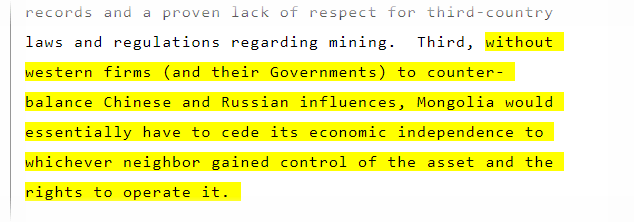
![“[The British Ambassador to Mongolia] noted that Mongolia had not really grasped the implications of its ‘Third-Neighbor’ policy. Her Majesty’s government was reconsidering its level of engagement with Mongolia because Britain had little of substance on the ground. If Mongolia wanted the British relationship to continue or increase, it had to do what was necessary to get British investment. If Mongolia really wants to balance China and Russia with investment and political support from Britain, the U.S., Canada, Japan, etc., then it must create and sustain an environment conducive to investment[17] .” (January 2008)](https://mongolia.somo.nl/wp-content/uploads/2020/02/Quote-7-the-british-ambassador.png)
![“During the January 10 breakfast, Minister Emerson and his delegation also heard a range of viewpoints regarding the GOM’s approach to mining. Mining representatives delivered consistent points to the Minister. Firms stated they are able and willing to handle the commercial aspects of their respective businesses, but they want and need foreign governments to project a united front to the GOM to cover their political flank. In short, the mining companies told Canada to join U.S., British, Japanese, Australian and German efforts to encourage (cajole, harangue, etc.) the GOM into staying out of the mining business while creating a transparent, predictable, best practice-based, rule of law approach to regulating and profiting from its resource base. The British Ambassador echoed these sentiments. […]](https://mongolia.somo.nl/wp-content/uploads/2020/02/Quote-8-during-the-january-10-breakfast.png)
